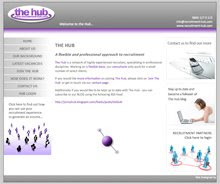
In a climate of skills shortages and severe competition for the best potential recruits, how do you best stand out from the crowd? An employer brand has the ability to attract and retain the right people, influence productivity, engage, motivate and innovate. Employer branding highlights the importance of taking the hiring process seriously and the rich rewards it will bring if you get it right. All employers, regardless of size, location and structure, have an employer brand, but many organisations lack the time, resources or knowledge to form a powerful strategy for their employer branding.
Good employer branding has a huge positive impact on an organisation's profile, attractiveness and strength. It's not just about about logos and clever adverts, it's about engaging with job applicants and promoting your organisation as an employer of choice, consistently through every aspect of the recruitment cycle. The way in which a candidate is treated during the recruiting process has a long lasting impact on your recruiting success and ability to attract top candidates.
In a nutshell, your employer brand is the voice and image of the communication you implement to attract and retain employees. It is what identifies you in the marketplace; it's what makes your company distinctive.
Still not convinced it matters? - Five reasons why employer branding really works:
1. Shortage of skilled labour: As the number of possible choices job seekers can make is becoming even greater in the marketplace and as globalisation impacts increasingly, employer branding strategies prove critical. Employer brands act as a psychological trigger in candidate's heads. These are very powerful triggers in the job market and can play a key role in candidate's job choice. Companies that are perceived to be attractive employers will have an easier time to recruit top talent.
2. More with less: a mantra coined during this economic downturn, there is high pressure to cut costs and increase productivity, which has made the need to get the right people in the right jobs even more crucial. Employer branding results in more successful recruitment and retention of top talent. Moreover, by properly communicating the reality of the work environment, companies are more likely to attract talent that fits their organisational culture, thus increasing the people with the right skills in the correct positions.
3. Growth & profitability: hiring and retaining top performers is essential for growth and to maintain a competitive edge. Employees who have the right skills, experience and knowledge, in relation to the critical areas of a business to drive growth, are strategically important. Bottom line, employer branding increases your profit margin.
4. Popularity: research on the talent market reveals that people want to work for companies with great reputations, and they often turn to family members, friends or colleagues for advice and approval when making a decision about which employers to consider. In addition, the consumer/corporate/employer brands are becoming intertwined. If a company is viewed as being an unpopular employer, it will consequently affect everything else and cause disequilibrium in the corporate ecosystem.
5. Strength: being an attractive employer provides a company or organisation more bargaining power, as employees will want to work for them more than anyone else, even those that have rare and in demand skills - irrespective of salary levels. In addition, good employer branding is constantly maintaining an image of being the most desirable employer, and giving the right reasons or incentives to attract the best candidates.
Remember that the actions and activities of organisations are becoming more visible due to the increasing number of people joining and posting comments on social and business networks such as Facebook, Twitter and LinkedIn. Employees and job applicants will continue ranking companies based on a higher level of internal insight into the company gained on online communities. As a result, businesses that promote good employment branding and communications will, in the long term, feature high on the “best places to work” lists and their employees will act as ambassadors of their brand. Every aspect of how prospective candidates are handled.
Of course, it is not just the communications aspect of the recruitment process that needs to reflect the employer brand. Every aspect of how prospective candidates are handled is worthy of consideration from the moment they make contact with the organisation through the selection phases to the subsequent offer or rejection. By recruiting intelligently and selectively you can better develop employee branding. Once your employees understand your brand and objectives—and buy in—they’ll be in a better position to act as ambassadors for your brand.










